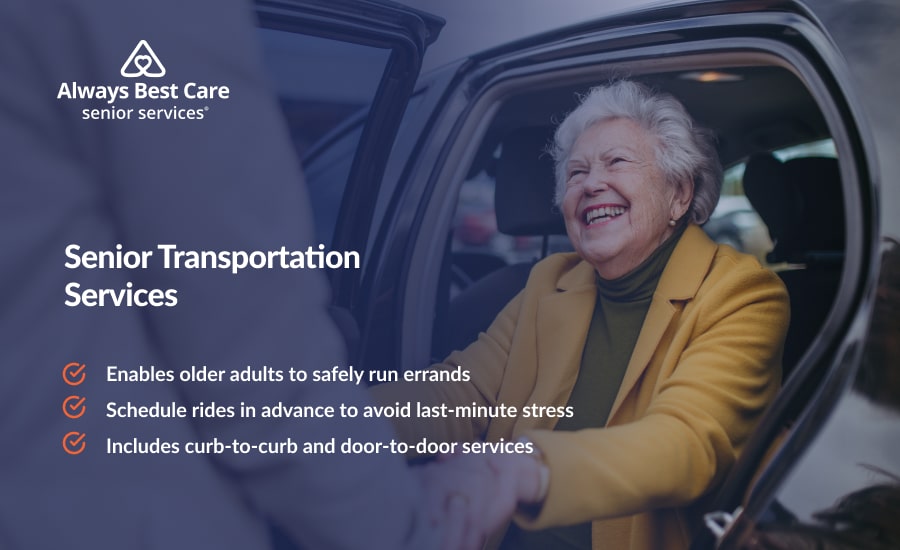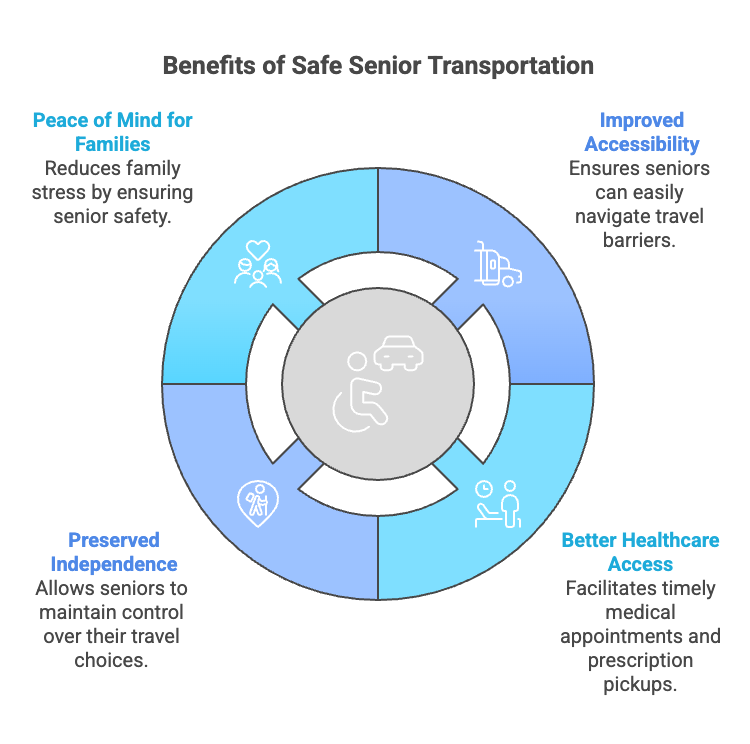Senior Transportation: Benefits, Tips & FAQs

Table of Contents
Senior Transportation Explained: Key Takeaways
- Senior transportation benefits include greater independence, easier access to care and activities, and peace of mind for families
- Our caregivers provide transportation any type of senior need
- If your loved one needs help getting inside or navigating stairs, be sure the service can accommodate that
According to the Federal Highway Administration, older adults are the fastest-growing group of drivers on the road.
But as people age, many experience a decline in visual acuity, especially in low light or poor contrast, making it harder to read road signs and spot potential hazards.
If you’re worried about Mom or Dad staying safe behind the wheel, it might be time to explore reliable senior transportation service from Always Best Care.
In this guide, we will:
- Explore the key benefits of senior transportation services
- Offer tips on choosing the right transportation service and making every ride safe and comfortable
- Show how our caregivers at Always Best Care can help your loved one safely get to appointments and run errands
Benefits of Safe Senior Transportation Services
Discover how the right ride can improve your elderly loved one’s quality of life.
1. Improved Accessibility and Enhanced Safety
Transportation for seniors isn’t just about getting from point A to point B; it’s about ensuring they feel comfortable, safe, and cared for every step of the way.
For older adults, even barriers like a high step or limited support can turn a simple outing into a struggle.
2. Better Access to Healthcare
Consistent and safe transportation helps seniors stay on top of their healthcare routines.
It allows them to get to doctor appointments, complete lab tests, and pick up prescriptions without stress or delay.
3. Preserved Independence
Letting go of driving can be an emotional and difficult transition. But with the right support, that sense of freedom doesn’t have to disappear.
When older adults can choose when to leave, where to go, and how they get there, they stay in control of their own lives.
Whether it’s through family, local services, or in-home care, providing safe transportation shows them that their time, choices, and independence still matter.
4. Peace of Mind for Families
Older adults are more vulnerable to serious injury in accidents, making safe and reliable transportation all the more important.
When they have access to senior ride transportation services, they can avoid driving in risky conditions or missing important doctor’s appointments, giving families peace of mind knowing their loved ones are safe.

How To Find the Right Senior Transportation Service for Your Loved One
A reliable ride can mean the world to an elderly individual. Here’s how to find one that checks all the boxes.
1. Start by Identifying Their Exact Needs
Begin by understanding what kind of support your loved one requires.
- Do they use a wheelchair or walker?
- Can they get in and out of the car on their own?
- Is your elderly loved one mostly going to medical appointments, or do they also want transportation for shopping, errands, or social visits?
2. Research Local Services
Look into specific providers in your area, such as:
- GoGoGrandparent: A service that connects older adults with on-demand transportation and other services without needing a smartphone
- Veyo: Often used for Medicaid-eligible non-emergency medical transport
- Home care agencies: Many agencies now offer transportation as part of their services
3. Look for Accessibility Features
Make sure the transportation provider can accommodate your loved ones’ physical needs.
Ask if their vehicles have features like wheelchair lifts, low-step entry, or handrails.
It’s also helpful to know if drivers are trained to assist with mobility aids and whether they offer door-to-door or curb-to-curb service.
4. Ask About Scheduling and Availability
Not all senior transportation services are available 24/7, so find out what hours they operate and how far in advance rides need to be scheduled.
Some can do same-day pickups, but others might need 24 to 48 hours’ notice.
If your loved one has regular appointments, like physical therapy or weekly exercise classes, it’s worth checking if you can set up a recurring ride in advance.
5. Understand the Costs
Ask for a clear explanation of pricing.
Some companies charge per mile, while others charge per ride or hour. Be sure to ask if they offer membership plans, bundled packages, or special discounts for seniors.
Check whether the service is covered by Medicaid, the VA, or other assistance programs. Some non-profits, like such as Senior Rides And More, also offer free rides.
6. Involve Your Loved One
Include your loved one in the decision-making process. Their comfort level with the driver, vehicle, and scheduling process matters just as much as the practical details.
When they feel heard and respected, they’re more likely to feel confident using the service on their own.

7 Tips for a Safe and Comfortable Ride for Seniors
A comfortable, worry-free ride can go a long way in helping seniors feel independent and empowered.
These quick tips can help make that a reality.
1. Plan Ahead
Whenever possible, schedule rides in advance to avoid last-minute stress.
Confirm pickup times, destinations, and any special assistance that might be needed. If it’s a medical appointment, build in extra time for check-in or unexpected delays.
2. Dress for Comfort and Safety
Choose weather-appropriate clothing and supportive, non-slip shoes. Wearing layers makes it easier to adjust to different temperatures between home, the vehicle, and the destination.
3. Pack the Essentials
Bring a small bag with must-haves: a phone, ID, insurance card, a list of medications, water, and any mobility aids needed.
These items ensure your loved one has everything they need in case of delays or unexpected issues.
For longer trips, consider adding snacks and emergency medical contacts to stay comfortable and prepared in case of an emergency.
4. Use Mobility Aids Safely
Check that canes, walkers, or wheelchairs are in good working condition and can be securely stored in the vehicle. Don’t hesitate to ask the driver for help getting in or out of the car.

5. Speak Up About Needs
Let the driver know if your elderly loved one needs help with steps, seatbelts, or getting to the door.
Don’t hesitate to speak up about things like air conditioning, music volume, or seat comfort, as small comforts can make the ride feel more enjoyable.
6. Prioritize Vehicle Safety
Always buckle up and don’t rush when getting in or out of the car. Take your time and move at your own pace.
Use handrails for extra support. Seniors with balance concerns might also feel more comfortable in vehicles with low-step entries.
7. Stay Calm and Confident
A supportive driver and a predictable routine can help ease anxiety. Gentle conversation or deep breathing can also help, especially if you’re going through a new route.
Find Reliable Senior Care Services at Always Best Care
Many older adults start feeling unsure behind the wheel or might need to stop altogether because of changes in vision, medication side effects, or mobility challenges.
While Always Best Care doesn’t offer a separate transportation service, our in-home caregivers are here to help.
They can drive your loved one to doctor’s appointments, pick up prescriptions, or tag along to a weekly card game, church service, or even a simple lunch out.
Our caregivers stay close during outings to offer steady support, help prevent falls, and make sure your loved one feels safe every step of the way.
Senior Transportation: FAQs
- Does insurance or Medicare cover senior transportation?
Medicare usually covers emergency and certain nonemergency medical transportation, as long as it’s medically necessary and meets specific guidelines.
- Do drivers assist seniors to the door or into the building?
Some services offer curb-to-curb service, while others provide door-to-door or even door-through-door assistance.
If your loved one needs help entering buildings or navigating stairs, confirm that this level of support is needed.
- Can family members ride along?
No, family members usually can’t ride with senior-specific transportation services unless they also qualify as seniors or have a caregiving role that requires them to be there.
For instance, a family member might be allowed to ride along if the senior has mobility challenges, cognitive impairments, or needs assistance during medical appointments.





